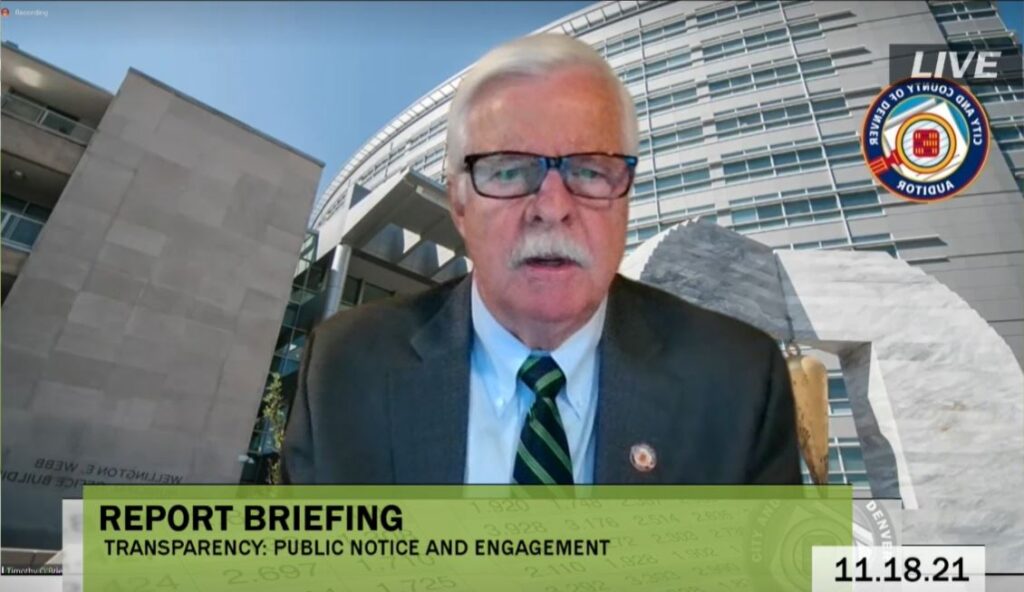By Jeffrey A. Roberts
CFOIC Executive Director
The city of Denver should improve the way it communicates with the public to make sure community members are sufficiently informed about city government and meaningfully engaged with the decision-making process, a new report from Denver Auditor Tim O’Brien says.
“Communicating with the public is important but difficult to do effectively — and not all city agencies take it seriously enough,” O’Brien said in a news release Thursday. “When you’re building a bike lane or doing road work, for example, those are projects residents want to know about ahead of time, not find out about when they’re already commuting home.”
The auditor’s office examined how the city complies with public notice requirements, identifying issues “that may limit the public’s awareness of city activities.” It also looked at the accessibility of information on the city’s website and outreach efforts for engaging the public.

Of three Denver agencies studied, two “did not thoroughly or consistently adhere to public notice requirements.” The Department of Community Planning and Development “fully complied” with minimum requirements to notice public hearings for the group living amendment passed by the city council in February. But the Department of Transportation and Infrastructure couldn’t show that it fully complied with its own public notice requirements for bike-lane installations projects on East Florida Avenue and East Jewell Avenue. And 10 commissions overseen by the agency for Human Rights and Community Partnerships “exhibited a pattern of noncompliance” with the city’s open meetings requirements.
A city ordinance requires at least 48 hours’ notice before meetings of public bodies, stricter than the 24-hour notice provision in the Colorado Open Meetings Law. Reviewing posting practices for meetings held January through April 2021, the auditor “found that none of the 10 commissions fully complied with open meetings or records requirements for meetings held in that time. Most commissions were missing some or all of the expected meeting agendas for these months.” Eight of the 10 commissions had not uploaded minutes for meetings in January, February and March.
The auditor noted the July 2021 passage of an ordinance that updates the list of city public bodies subject to open meetings requirements and adds provisions for the public to be electronically notified of meetings.
The audit says city agencies agreed to implement the auditor’s recommendations, which include making the city’s website more comprehensive and centralized. As currently structured, the auditors found, residents interested in a particular project must already know which agency oversees that project. By contrast, the websites for Lakewood and Boulder have dedicated portals for finding project information and identifying “engagement opportunities, such as public meetings or contact information where the public can provide input to the city.” Lakewood’s website has an interactive map of neighborhood projects.
The mayor’s office agreed to determine the feasibility of developing similar searchable project maps as well as a centralized repository of public meeting notices and city agency calendars.
“A transparent government seeks to ensure community members affected by government decisions can both influence and actively participate in making those decisions,” O’Brien’s news release says. “By providing more access to public notices and structure and guidance around public engagement, the city could ultimately provide higher-quality services to residents and business owners.”
Follow the Colorado Freedom of Information Coalition on Twitter @CoFOIC. Like CFOIC’s Facebook page. Do you appreciate the information and resources provided by CFOIC? Please consider making a tax-deductible donation.




